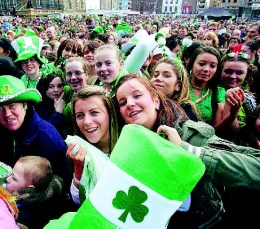‘Everyone can be Irish if they want,’ says a leading Government minister, but Ireland-based immigrants tell another story. CATHERINE REILLY reports
A RARE moment of consensus between Fianna Fáil and Fine Gael came during a recent Dáil debate on the Irish diaspora.
Deliberating on the numbers of ‘Irish’ around the world, Foreign Affairs Minister Michael Martin settled on the most all-encompassing figure possible: 70 million-plus, all of whom “consider themselves to be part of the global Irish community”, he said.
“The Government takes a broad and inclusive approach when it comes to defining our global community,” he explained. “The Irish diaspora is not limited to Irish-born people living overseas or to those who have activated Irish citizenship. Instead, it encompasses all those who believe they are of Irish descent and feel a sense of affinity with this country.”
A ‘hear, hear’ came from Fine Gael TD Billy Timmins. Acknowledging that the 72 million figure was “startling”, and that his categorisation was “rather broad”, he nevertheless added: “Many people who feel they are Irish may have no Irish connections, but everyone is welcome. It is a resource that we should tap into and utilise.”
But the ‘everyone is welcome’ sentiment is open to dissection – by both Irish emigrants, and immigrants to Ireland. Indeed, some Irish emigrants can recall a time when they felt discernibly unwelcome.
“To be honest, my own experience of going home – I left in 1972 – was not always good, ” says Patricia Harty, editor and co-founder of Irish America magazine in New York.
“The returned emigrant of that time was often met with a kind of resentment. One had to be careful not to use American words; people were always on the look out for any ‘Yankiness’ that one had picked up.”
However, Harty says there has been “a sea change” in Ireland’s collective feeling towards its diaspora, which she largely attributes to two factors: former president Mary Robinson lighting a candle in the window of Áras an Uachtaráin to welcome returning emigrants; and the events of 9/11, its huge number of Irish-American casualties and the cross-Atlantic mourning ritual that this evoked.
“I don’t believe that you have to be born on the island of Ireland to be Irish,” adds Harty, “and I think that if you look at our own genetic makeup – Viking, Dane, Celtic, English – there is no such thing as a pure Irish person, anyway.”
Yet according to immigrant representatives in Ireland, the ideal of a pure Irish person seems to persist in the motherland.
Ghana-born Eric Yao, co-ordinator of the Africa Centre in Dublin, says that for him, the question of Irishness involves two central issues: tangible Irishness, through naturalisation; and whether the society accepts you as Irish, regardless of the country name on your passport.
Firstly, says Yao, the citizenship fee jumped from €650 to €950 in summer 2008, a rise he feels was disproportionate. And he’s concerned at ongoing incidences of immigrants being refused citizenship for reasons he considers as unfair.
“I know people who’ve lost their jobs, gone on the dole and who’ve had their citizenship refused by virtue of that,” he says.
Currently it takes two years to process citizenship applications at the Department of Justice, and more than 18,000 people are awaiting decisions.
Moreover, even when one has official ‘Irish’ status, it can be in name only. Yao is an Irish citizen, and recalls the puzzled and even hostile expressions on the faces of interview panellists when they scrutinised his CV, which read “Nationality: Irish”.
“More should be done,” says Yao. “It’s about general acceptance. Even my own children feel a bit funny, they are not really sure where they stand ”
His oldest, a 12-year-old girl, was born in Ghana; his son is 10 and born in the UK. Both have lived in Ireland for most of their lives.
However, it should be remembered that not everyone in Ireland wants to be Irish. Arunas Teišerskis doesn’t say it, but one gets the impression that the Lithuanian community representative finds terms like ‘the new Irish’ faintly ludicrous.
“We actually are what we are – Lithuanian, Polish and so on,” he says of the immigrants that arrived post-2004, “because we’ve grown in our own culture.”
But a more complicated identity situation greets the younger generation, he acknowledges. Children of Lithuanian parents born in Ireland and raised here can certainly consider themselves either Irish or Lithuanian, he says.
Mostly, he explains, Lith-uanian parents try to instil knowledge of Lithuania in their children – just like the Irish did in the US. But the situations vary.
“I know families who are trying to make the children as Irish as possible,” he says, “and I know absolutely different examples where the emphasis is on their parents’ cultural background.”












